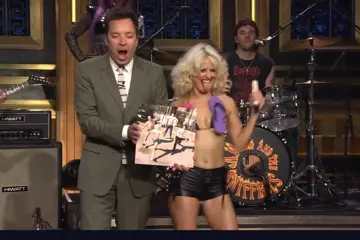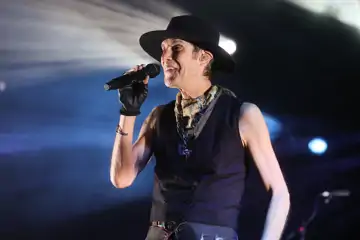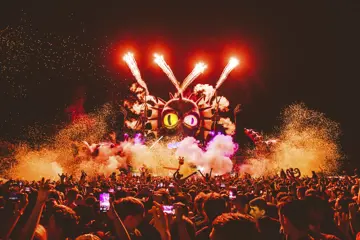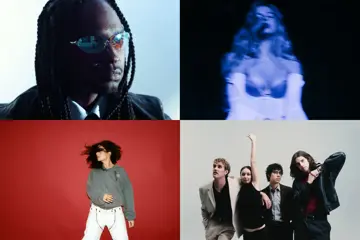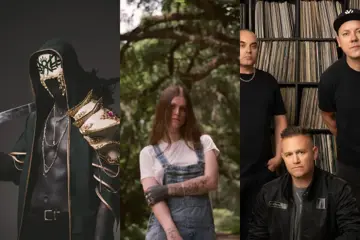In Peter Jackson's three-film, '00s-spanning The Lord Of The Rings trilogy, the seemingly-unending swords-and-CGI saga was strung along by its central thematic cliff-hanger: would twinky, bluey-eyed, chubby-chasin' top Frodo Baggins (Elijah Wood, child-star turned screen creep) and his portly, rosy-cheeked, eternally-lovin' bottom 'Your' Sam (Sean Astin, fatkid Goonie all grownz up) finally consummate their burnin' love and just make-out before all 10 hours are up? It provided a sustained sense of sexy, sexy sexual tension to string along three ungodly-long pictures that featured swordfights, New Zealand-tourism copter-shots, swordfights, pan-pipes, and also swordfights. Theoretically, what 'hung in the balance' was the fate of Middle Earth; people out there supposedly sitting in thrall to discover whether good would triumph over evil (spoiler alert: it would). But, really, cinemas were actually filled with people just waiting for our central couple to just like fuck already. It was rather like Moonlighting, but with Hobbits, and no women in it, and plentiful propaganda for the military-industrial complex and the war on terror. It was also the most overrated film institution in a quarter-century; receiving praise beyond its narrative station unseen since George Lucas and his silly tales of space apes and teddy bears sold infinite toys (or, y'know, collectibles, if that's really how you really want to really live your life) in spates of Star Wars. The acme model for the modern trilogy, Star Wars was an obvious antecedent to The Lord Of The Rings. And, now, it's grown even more obvious, in the kind of depressing fashion all-too-familiar for those whom the spectre of Jar-Jar Binks is the stuff of post-traumatic stress disorder.
Stop me if you've heard this before: chunky, bearded, effects-loving filmmaker makes trilogy that earns shit-tons of cash, credibility, and a cult following that borders on minor religion. In the wake of such success, inspiration dwindles and, well, the film-biz sharks do make a convincing point when they lay out all those spreadsheets... And, so, once-beloved director-that-taught-a-million-children-to-dream goes back to the old saga, and starts work on a trilogy of prequels. Pants are peed in delight, future earnings are projected, and another whole decade is set aside for a run of these popcorn sagas. Only, in the lead-up to the first prequel, the chunky, bearded, effects-loving filmmaker spends all his time talking about technology, technology, technology; the media narrative —the story in the absence of any— becomes not just about how much fucking money this whole thing cost and will make, but about specific technical nerdery. And then, finally, the film arrives; the long-heralded day here; this a cinematic event akin to revealing another testament to the bible. And the film fucking sucks.
Whether you've suffered through 10 interminable hours of this Hobbit racket already, whether The Phantom Menace destroyed all of your cherished childhood memories and proved a sad symbol of the passage of time, whether you speak Elvish or Klingon or LOLcats, whether you're an angry film-critic who resents having to watching countless iterations of the same tedious adventure or a young dreamer ready to escape into a magical cinematic fantasy world, the end result is the same: The Hobbit: An Unexpected Journey is unspeakably dull. Like the other tedious saga, it begins with a premise that is dramatically inert: sending a merry band of adventurous caricatures into a boy's-own fantasy world free from females but filled with phallic objects, on a quest that has a 100% chance of succeeding. In one of the film's most busy CGI work-pieces, the fraternal fellowship of Hobbit, Wizard, and dozen dwarves fights their way out from the inside of a Goblin kingdom, which feels a lot like the rave-caves of The Matrix, only with less dreadful industrial music and dreadlocks; or, maybe, more like a more-dystopian Fraggle Rock. Casually slaying marauding hordes of endless monsters as they beta-test the forthcoming arcade-game by running along a series of rope-bridge platforms, en route to escape, it's a sequence in which cinematic sound and fury signify a dramatic nothing. It has all the gravity, heft, and suspense of a Saturday morning cartoon, one of those '80s toy tie-ins that took place in some eternal Groundhog Day, and went the same every episode. Though the tale-of-the-tape for the battlin' battalions would total, roughly, 14 vs 10,000, there's not a doubt, not for a single second, that this will be anything but a jolly old cake walk for these hardy boys and their morally-righteous mettle. When Gandalf goes through tallying heads after their 'miraculous' by-the-skin-of-their-teeth escape, he sounds rather like a headmaster counting schoolkids back on the bus after an excursion —where the Dickens is Baggins?— and not like someone who just stared near-death in the face and somehow —along with every member of his travelling troop— lived to speak of it.
Summoning schoolboys means we should classify: these are most certainly public schoolboys, if not trade-college kids. The dwarves are, in a troubling philosophical decision carried over from The Lord Of The Rings, all Scottish. And, moreso, all Scottish stereotypes: loud and uncouth and lager-lovin' and spoilin' for a fight after a few pints on a Friday night. Scottish national cinema has turned such a stereotype into a fearsome, loathsome creature —see: Peter Mullan's entire career— but, here, Jackson plays it all for 'laughs'; we invited to slap our knees with cliché-lovin' mirth each time one of them burps or farts or is fat, things that apparently really require a presentation in 3D. In a gesture familiar to anyone who's ever watched any period-piece ever, the old English class system is handily borrowed as a storytelling shortcut for any culture past or fantasised, making Middle Earth instantly fit the most familiar of archetypes. Of course, this bawdy British knees-up also goes against the original source-text, a pre-World-War-II primer for boys soon to be sent off to war in which the dispossessed dwarves were handy symbols for the Hebrew in an age of rising anti-Semitism: short, swarthy, good with money, driven from their land and now left to wander in scattered diaspora, exiles destined for extermination at the hands of an evil empire, yet blessed with a divine plan to reclaim their rightful sacred land from the grasp of heathen hands. It's a crude, near-racist reduction, but, hey, I didn't write it.
J.R.R. Tolkein did, of course; and he wrote it —and the whole of The Hobbit— across 300 pages. His three-volume text for The Lord Of The Rings, in comparison, spanned 1500 pages. You don't need to be a troubled-yet-attractive janitor at MIT to notice the mathematic disparities in the sources for these twin trilogies: the LOTR movies about trying to cram in as much of that text is possible, The Hobbit movies about endlessly padding out a minor story way beyond the point of boredom. That two more instalments —six fucking hours!— of Hobbitry are due the next two Christmases makes me feel like someone who knows that two stints of major dental surgery loom in my future. Both, after all, involve wearing uncomfortable sunglasses, and are, in their own way, a mixture of tedium, humiliation, pain, and a constant, nagging reminder of your mortality. My advice for anyone about to watch either this or any other Hobbit movie: make sure you've been thoroughly numbed in advance.

Les Misérables
Les Misérables has been roundly —rightly— praised for one glorious directorial decision: that Tom Hooper's big-screen adaptation of the perennial musical would feature its actors not miming along to playback, but, instead, actually singing on set. It was a decision so simple that it borders on genius. After all, the appeal of stage musicals —of any live performance— is seeing sound literally created before your eyes, and, by having his actors actually singing the words, Hooper can avoid the inevitable screen-musical cringe that comes when the music pipes up and the lip-sync kicks in. Just the other week, I lamented how a cappella teen-com Pitch Perfect was, despite its subject matter, actually terrified of the human-voice; replacing it with a pitch-corrected, dynamic-range-compressed concoction that killed the narrative any time it piped up on the sound mix. Les Misérables carries the complete opposite of this feeling; the narrative flowing naturally as its moves into and out of songs; and, thus, making good on Stanley Donen's declaration that those instances of to-and-fro transition are the most telling moments of any musical. As bearded Aussie beefcakes Hugh Jackman and Russell Crowe —rivals over generations— slip into and out of song, their voices are always coming from the same individual, in the same moment; this a film utterly in love with the human voice.
And Les Misérables loves not just the voice when at full, theatre-filling caterwaul, but in the spaces between the notes. Recording live on set —recordings which were helmed by production sound mixer Simon Hayes, the unsung(!) hero of the piece— means that we don't just get the usual studio assembly of chopped-and-recombined bits-and-pieces, but whole, unbroken takes. And hearing all the inhaling and exhaling, the breath and gasp and strain and huff, weirdly reminds me of the work amazing artists like Matthew Herbert and Camille, whose devotions to vocal elasticity and unvarnished reality find their records filled not just with singing, but everything that comes with. Les Misérables' fidelity to whole takes is, when you break it down, a cinematic, narrative-driven treatment of performance that, musically, comes across as radical. Its vocal approach is essentially avant-gardist, sending a shock of bona fide life through what's, otherwise, a fairly generic orchestral presentation of the music (whilst we're talking of Hebert/Camille types: taking the avant-gardism to its conclusion would've meant having Nico Muhly or Jonny Greenwood or a Dessner or someone at work on the orchestrations, taking these community-musical standards to unexpected places).
The real, actual, human singing of the piece isn't just the main takeaway —and the most pleasing part of the picture— but a symbol of all that Les Misérables tries to accomplish; which is, to say, a strange marriage between cinematic realism and theatrical hyper-surrealism; where dirty faces/ fingernails and that raw singing are set against flurries of CGI fantasia and moments of high, high drama. And no one makes this marriage seem so profound —and owns the singing-as-you're-performing technique— as thoroughly as Anne Hathaway. Hathaway is in the 160-minute film for, at best, half-an-hour, but in that time she makes it her own; setting a resounding emotional tenor that ricochets throughout. Her performance is so committed, so on-the-edge, so filled with genuine emotion summoned through method technique, that she almost feels incongruous with the cavorting song-and-dance numbers elsewhere; watching her akin to those times when you see Isabelle Huppert turn some fluffy French farce into a harrowing psychological scream, or Christopher Walken summon genuine terror in some low-brow family comedy. You never quite believe Hathaway is a syphilitic village prostitute in 19th-century France, but, then again, straight suspension-of-disbelief is never going to quite happen with Les Misérables, all the field-recorded vocal takes in the world not about to make you forget you're watching Hollywood stars singing and dancing and prancing their way across green-screen sound-stages constructed into post-hoc portraits of postcard Paris. Seeing Hathaway's conviction, in turn, doesn't make emotions palpable in the regular dramatic experience; where thespian pretending is a spell that convinces audiences to feel for a character as if a real person. Instead, this is something far more meta: emotional frisson at a weird remove. Here, Hathaway is so magically moving not because you believe she's a syphilitic village prostitute in 19th-century France, but because she is Anne Hathaway. Bearing witness to an actor so utterly hurling themselves into their role, so dredging up their own emotions in search of method-acted real tears, that conviction is what becomes moving; not the broad caricature or the tragic drama or the soap-operatic plot developments, but the sight of a starlet getting utterly getting guttural in pique of desperation; even if you know that, really, what she's desperate for is an Oscar. Perhaps if Hathaway had to carry the whole narrative, this performance would become a kind of trauma. That, like Björk in Dancer In The Dark or Maria Falconetti in The Passion Of Joan Of Arc (the latter something Hathaway's head-shaven, tear-streaked face is so strongly —deliberately— evocative of), having her real emotions so close to the surface, for a sustained piece of cinematic exploitation, would bring with it off-screen pain. Instead, Catwoman gets to live fast, die young, leave a good-looking corpse, and flirt with Jackman from beyond the grave; Hathaway transforming the film apace then dying (um, spoiler?), with a theatrical swoon; her performance as if too passionate to be sustained, especially in a film filled with so much stuff happening.
Stuff like: Hooper occasionally sticking his camera, for a shot or two, on genuinely strange angles, which sadly feel more like jarring moments of stunt-framing rather than any coherent directorial statement. Or the amusing irony of the world paying good money to hear the lead singer of Thirty Odd Foot Of Grunts sing; or the bizarre turn-up that Crowe's kinda-bad singing herein has a charming quality in step with the film's vocal-realism; Rusty stepping between speaking and crooning like a priest delivering mass, his voice all unsuredness and warble and crack; thus pretty much the opposite of your generic stage-musical belter, and thus super-interesting. Or the student uprising and the political relevance of acts of seditious defiance in the era of the Arab Spring, occupy Wall Street et al; the June Rebellion lionised as act of ideological heroism unstigmatised by the finger-pointing of terrorism. Or, sadly, the way that such a French story is run through that troublesome cinematic substitution where any period-piece culture is Merry Olde Englande-ised; the characterised short-hand of toffee upper-cast and tavern-dwelling, mead-swilling, teeth-rotting cockney wretches too weighty a set of assumed and understood stereotypes to throw off.
This reaches a nadir with Helena Bonham Carter and Sacha Baron Cohen as a pair of bawdy, thievin' scoundrels whose knees-up hijinks grow increasingly less funny and more annoying with each passing appearance. Their Thénardiers may be a beloved part of the stageshow, but they feel like refugees from someone else's adaptation; craven caricatures that jive incongruous with this film's greater dreams of desperate realism. Hooper's decision to have songs sung live on set was, indeed, a masterstroke, but it doesn't extend to the whole; the presence of the two-bit comic relief —so begging to be sent to the cutting-room floor— feeling symbolic of the film's failure to totally, truly transcend the baggage that comes with making Les Mis for screen. In the end, we have to settle for way-better-than-expected; which, all things considered, ain't no complaint.


